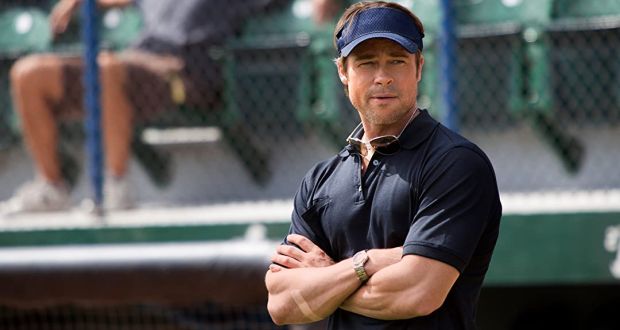 “It’s unbelievable how much you don’t know
about the game you’ve been playing all your life.”
— Mickey Mantle
“It’s unbelievable how much you don’t know
about the game you’ve been playing all your life.”
— Mickey Mantle
With the first week of April comes a treasured ritual for many: Major League Baseball’s Opening Day. And in fact, ten years ago this spring, a man named Billy Beane changed baseball forever.
Do you know Billy Beane? If you’re reading this blog, I’m guessing that there’s a good chance you’ve seen the Oscar-nominated movie, Moneyball, and maybe you’ve even read the book. I saw the film recently, and it offers a stimulating look at the revolutionary change that Billy Beane brought to the Oakland A’s a decade ago. But more importantly, Moneyball is a compelling metaphor for the change that’s happening all around us and is affecting our lives and our careers in ways large and small.
The nutshell version of Moneyball is this: In 2002, the general manager of the Oakland A’s, Billy Beane, substituted the statistical theory of the eccentric Bill James for conventional wisdom and the intuition of the team’s baseball scouts. Amid much gnashing of teeth, this new system helped the team find and sign overlooked players who could be had for bargain-basement prices. This in turn allowed the A’s, which had one of the smallest payrolls in baseball, to compete with the very best teams in baseball and break an all-time American League record with 20 consecutive wins during the season.
While they did not become World Series champions, the A’s did make the playoffs, which in itself was an astounding achievement from where they were earlier in the season after losing three of their top players. And more significantly, Beane’s statistical strategy was immediately adapted by the Boston Red Sox, which two years later used it to win their first World Series since 1918. The Red Sox followed this up in 2007 by winning their second World Series in four years, and by that time the entire baseball world had been won over by statisticians from the Ivy League.
Writers such as Jason Fell have already done a good job of describing the lessons that Moneyball holds for business people in any industry. He finds the following three lessons: 1) Make change when it’s needed, 2) Stand by your decisions, and 3) Set realistic goals. Fell’s first lesson strikes me as the most important one to come out of Moneyball, and it’s worth a closer look.
“Make change when it’s needed” sounds straightforward and easy, doesn’t it? Yet, this may be the most difficult lesson to enact in real life. How can any of us say for certain when change is needed? Reasonable people disagree all the time about this, whether it’s in the baseball clubhouse or the executive lunchroom. In fact, change is guaranteed to be the one constant in our lives and careers. All of us are surrounded by so much change on an ongoing basis, how are we to make sense of it all? A popular axiom would have us “embrace change,” but if we were to do so indiscriminately, we would have no time for anything else. Luckily for us, Moneyball offers a way to work through these questions.
Moneyball‘s Three Lessons on Change
Moneyball offers the following three lessons on change: 1) Change is Hard, 2) Adaptability is Essential, and 3) Balance is Beautiful.
1. Change is Hard. In Moneyball, we witnessed how difficult it was for Billy Beane to enact change in the A’s clubhouse – and in that room, he was the boss. I’m sure many of us have at one time or another felt like Beane in front of one or two or even a roomful of those who opposed our plans to bring change to an organization. Most of us don’t need to be reminded how difficult change can be.
Of course, even those of us who may think of ourselves as change agents nonetheless can be our own worst enemies when we are the ones who need to change. After all, when we’ve been doing something for years – or even decades – it can take a lot to impress upon us that What Got Us Here Won’t Get Us There. And as the years add up, new things increasingly strike us as faddish. Is this legitimate or an excuse? It can be a little of both, but more and more, we aren’t willing to put in the effort necessary to learn new things. Generally, it can seem like too much work to change the way we’ve been operating for years.
2. Adaptability is Essential. Change can come from any of a number of sources. In Moneyball, it came in the form of a twenty-four-year-old with some very new ideas for doing things. These ideas were then picked up by the team’s GM, who, with the owner’s blessing, was in a position to make everyone else on the A’s payroll either buy into them or make other plans elsewhere. This may sound familiar, because it is, all across the land, in all types of businesses.
Adaptability means a willingness to change. Does that mean that you must always accept whatever new ideas cross the transom? No, it doesn’t. But the days are long gone when we could retire after having done the same work in the same way for our entire career. In fact, that past feels like so long ago that it seems quaint, if not altogether mythical.
3. Balance is Beautiful. The A’s didn’t start the 2002 season strong; in fact, by summer, many critics were calling Beane’s theory a failure. But the GM showed that neither he nor the season were yet over as he made a flurry of mid-season trades and changed his practice of how he dealt with his players. By getting rid of a bad apple, he showed an awareness of the importance of the human element and an understanding that teams do not succeed based on numbers alone. And he began working more closely with his players, explaining how the sabermetrics system was supposed to work – and what they should be doing to be successful within that program.
Through this effort, which included strengthening his connections with the players and providing personal motivation, Beane transformed his statistically promising but confused and underperforming club into a much more tight-knit group that understood the overall mission – and their individual roles within it. This is the club that went on to win a record 20 consecutive games.
Even though Beane’s method of picking players was based on a statistics-crunching computer program, he came to understand that a balance was needed between manipulating the numbers and connecting with the players. Computers don’t swing the bat or run the bases, but they can help you to figure out who should be doing those tasks.
Similarly, there are always new things coming down the pike – and success typically is found when one discovers a healthy balance between the best of the old and the new. Whether it’s new theories, technologies or products, the rate of change has increased by an order of magnitude in recent years – and it won’t be slowing down anytime soon. That said, not everything new is worth your time. However, it’s equally true that just because it’s new does not mean that it’s merely a fad or otherwise unworthy of your time.
Yes, change is hard. But that doesn’t mean it should be ignored. In fact, adaptability to change is an essential skill these days. Without it, you will soon feel lost in your own office. Just remember that you should always seek a balance, for by keeping the best of the old and adding in the very best of the new, you will be certain to find yourself on the winning path.


